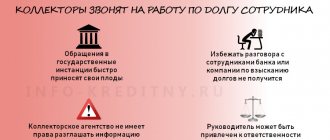Legislation on the activities of collectors
The negative opinion formed in society about collection agencies originates from times when their activities were regulated rather weakly or not regulated at all. As a result, numerous unscrupulous services often took harsh and even aggressive measures towards borrowers, which created a negative image. But as of January 1, 2017, Federal Law No. 230-FZ provides for how the work of agencies is regulated. The new rules established restrictions on the time and number of calls and other methods of communication with the client, and also determined how the collector must communicate with the borrower. Today, every conscientious, law-abiding agency strictly complies with the requirements of the Federal Law and aims not to scare, but to help.
○ Law on collectors.
The activities of collection agencies are regulated by the Federal Law “On the Protection of the Rights and Legitimate Interests of Individuals...” dated July 3, 2016 No. 230-FZ (hereinafter referred to as the Law on Collectors), which came into force on January 1, 2021. After its adoption, the requirements for this structure were tightened and restrictions were added. Thus, now only those organizations that have received the appropriate license can conduct collection activities. Receiving such a document involves entering the company into Rosreestr.
The Law on Collectors also regulates methods of communication with the debtor.
When taking actions aimed at returning an overdue debt, the creditor or a person acting on his behalf and (or) in his interests has the right to interact with the debtor using:
- Personal meetings, telephone conversations (direct interaction).
- Telegraph messages, text, voice and other messages transmitted over telecommunication networks, including mobile radiotelephone communications.
- Postal items at the place of residence or place of stay of the debtor. (Clause 1 of Article 4 of the Law on Collectors).
When do debt collectors have the right to call?
The law limited the right of collection agencies to contact a client within a strict time frame. A debt collector can call a person no more than once a day, twice a week and eight times a month. By prior arrangement, the agent can meet in person, but only once a week. At the same time, the service employee must be polite and at the beginning of the conversation provide information about himself and the agency for which he works. Calls must be made during the time period from 8 am to 10 pm on weekdays with an appointment, which the specialist must notify in advance.
Collectors' procedure
Collectors have the right to take any measures only after concluding:
- agency agreement. An agency agreement is concluded between the bank and debt collectors. According to the terms of the agreement, the second party has the right to take actions to collect the debt from the debtor in favor of the bank,
- assignment agreement. Based on this agreement, the bank’s rights to the loan amount are completely transferred to the collectors, and they have the right to receive the debt in full.
Once the parties sign the agreement, debt collectors can begin to act.
Their activity consists of several stages:
statement of claim to court against a collection agency free in word format
- collection of information about the debtor (violator),
- then the debtor is politely asked to voluntarily fulfill the obligation. Such calls may continue for 60 calendar days,
- if the debtor ignores calls from collectors, then over time the calls become more frequent and more persistent. At the same time, collectors do not have the right to threaten and blackmail the debtor. They can only inform the offender what consequences such actions may lead to,
- if the debtor does not answer phone calls, then the collectors try to meet with the violator in person,
- if the collectors have taken all the measures they could, but the debtor has not fulfilled the obligation, then they have the right to refer the case to the judicial authorities.
By law, collection agency employees are required to communicate politely with the borrower and not put pressure on him. However, in practice there are often situations when collectors cross the line and begin to exert psychological pressure on the debtor or even insult him.
In this case, the debtor can appeal the actions of the collectors by contacting the court or the prosecutor's office.
What to do if the bank calls about someone else’s loan on the phone?
Does the rule apply on weekends?
Yes, collection agencies do have the right to call clients on weekends and holidays: this possibility is prescribed by law. But the time frame for such calls is even stricter: no earlier than 9 am and no later than 8 pm. The limit on the number of calls per day still applies: if you have already been called twice on weekdays, collectors do not have the right to contact you on weekends. Of course, the other rules - polite speech, absence of psychological violence, the need to provide information about yourself - are still in force. The time at which you were called should be calculated according to your time zone.
We stop illegal actions
Collection agencies began their activities about 15 years ago, but the legislation did not regulate the activities of employees of such organizations. When collecting debt, many debtors encountered threats, encroachment on property, and boorish attitude not only towards themselves, but also towards family members and acquaintances.
Federal Law No. 230 closed the issue of the activities of collectors. Government officials established clear boundaries of authority for agency employees and their working methods. When negotiating with defaulters, the number of calls, correspondence, and negotiations in person was limited. Thus, one of the prohibitions, according to the current legislation, is the case when collectors cannot call or send SMS messages from unknown numbers.
In other words, debt collection organizations were officially allowed to carry out actions against citizens of the Russian Federation using methods that do not violate the law. Damage to property and threats are prohibited. If the loan agreement does not provide for a clause stipulating the involvement of third parties, communication with the borrower by collection agencies is prohibited. In addition, financial institutions must notify the creditor if there is a change.
- no more than 1 call per day;
- no more than 2 SMS messages per day;
- weekdays from 8.00 to 22.00;
- weekends, including holidays from 9.00 to 20.00.
If the creditors' claims violate the established rules, when filing a complaint or lawsuit in court, administrative measures are taken against the agency. Debt collection officers do not have the right to disturb the debtor’s friends and relatives; they are allowed to file claims against the person himself or his guarantor specified in the concluded agreement.
Situations where representatives of collection services violate the law require the collection of the necessary evidence to file a complaint. When threats are received by telephone, it is possible to use a voice recorder. If attempts to intimidate are made in writing, they must be saved in the phone's memory. Subsequently, the recording and other information is provided to the police.
It is inappropriate to rely on collectors to comply with legal requirements. The main method that debt collectors resort to is to apply moral pressure. The debtor’s task is to record all illegal facts. Actions that violate the call schedule are regulated by Article 15.47 of the Code of Administrative Violations and are punishable by a fine of up to 50 thousand.
We invite you to read: What does it mean to demand evidence in court?
Knowledge of the law is a guaranteed success when communicating with representatives of collection agencies. You must ensure that your legal civil rights are respected. After Federal Law No. 230 came into force, conflicts with creditors decreased. Government representatives have developed additional amendments that are being approved by the State Duma.
When the law came into force, collection agencies were forced to moderate their ardor and begin collecting debts exclusively through legitimate methods. Endless calls, night visits, threats and other “effective” methods are a thing of the past. Of course, collectors are officially allowed to carry out debt collection activities, but this can be done in strict accordance with the letter of the law.
In other words, the rights of collectors under the new Law No. 230 are limited to a specific list. It is strictly forbidden to threaten the debtor, harm his property or insult the defaulter.
Another important nuance that simply cannot be ignored is the fact that the participation of a collection agency in debt collection is permitted only if the agreement between the bank and the client contains a clause allowing the creditor to contact another company to collect the debt. Among other things, the institution that issued the loan is obliged to inform the debtor about the transfer of relevant rights to collectors.
The main problem that many debtors faced was endless phone calls. Collectors did not pay attention to the day of the week or time. It was assumed that nighttime communication with a problem client was much more effective than daytime communication. The Law on Collectors, effective January 1, 2021, solved this problem by establishing strict time limits for making such calls.
On normal days, collectors are allowed to call the debtor from 8:00 to 22:00. Regarding holidays and weekends, calling hours begin at 9:00 and end at 20:00. Communication must be made with the debtor himself or his official representative (if any). Calls to relatives or friends are strictly prohibited.
Speaking about the number of calls that a collector can make within 24 hours, it should be noted that the law does not contain specific information on this issue. However, it is possible to call to account debt collectors who make more than two dozen calls every day. Such behavior is qualified as private interference and allows the debtor to appeal to the courts.
When and who can collectors call under the new law.
As practice shows, employees of collection agencies often threaten debtors with long legal proceedings, suggesting that the person will get scared and immediately find money to pay off the debt.
In fact, the collection agency has the right to initiate legal proceedings, but the only punishment that can be awarded to the defendant is forced repayment of the debt. A new payment schedule is drawn up, and the citizen will have to pay the specified amount monthly.
It is important to understand that only creditors who have been accredited and signed an agreement with a credit company can go to court. Among other things, when filing a claim, the debtor will not have to answer to the collectors, since the owner of the debt is the organization that issued the loan.
As mentioned earlier, the new law not only regulates the activities of collection agencies, but also gives debtors certain rights. Few people know, but the maximum duration of communication between a citizen and debt collectors is limited to four months, starting from the date the delay occurred. If the specified period has expired, the debtor has the legal right to refuse to communicate with collectors by sending an application to the credit institution.
In the event that an agency representative violates the law on debt collectors from January 1, 2021, refuses to give his or her name or the name of the company, threatens a debtor, or commits other unlawful actions, this is grounds for filing a complaint. It is important to understand that in order to consider the appeal, the applicant will have to provide evidence of the violation (recorded conversation, photographs, witness statements).
Few debtors know that there is no fine or other punishment for unwillingness to communicate with debt collectors. In other words, a person may simply not answer the phone. Among other things, the rights of debtors make it possible to eliminate the need for telephone communication altogether by submitting an application to the credit institution stating that the only method of communication is e-mail, since the telephone does not work.
If you wish, you can add the collection agency’s phones to the “black list”, or even purchase a new SIM card. In the second case, the number should be registered in the name of a friend or relative, because otherwise, creditors will find out about it within a very short time. The law also provides for a number of cases when collectors cannot call debtors at all:
- The woman is in a position;
- The debtor has a baby who is not yet 1.5 years old;
- Debtor disabled I gr.
Of course, not all collection agencies are ready to comply with the law, and debtors face unlawful actions on the part of collectors. In such a situation, a citizen can protect his rights and interests in court, subject to the presentation of appropriate evidence.
Can debt collectors communicate on weekends in other ways?
The legislation stipulates several methods of communication, not only telephone calls: letters, telegrams, SMS messages. They are subject to the same time restrictions: the collection agency has no right to call in the middle of the night. Unscrupulous agents may take advantage of the borrower's ignorance of the law and claim that their attempts to contact are completely legal, but this is not the case. As for personal visits, they should be carried out during the day, preferably by prior arrangement. A person is not obliged to let collectors into the house: if an unscrupulous service employee insists on an invitation, you have the right to refuse.
What to do if collectors call on a day off
If the call was made within the permitted time and does not violate the law in any other aspect, there is no reason for complaints or proceedings. An agency that behaves in good faith is interested in the borrower getting rid of financial obligations and successfully resolving the difficulties associated with debts. Therefore, if debt collectors call on weekends and holidays, but act within the law, the best solution is to answer. Often, an agent can offer more favorable terms for repaying a loan than a bank would: the peculiarity is in the individual approach. Clients who cooperate are given the opportunity to write off part of the debt or otherwise optimize payments.
If the law is broken.
If collectors somehow violate the law, you should not answer them. Instead, you can file a complaint with the National Association of Professional Collection Agencies (NAPCA) on its official website. The Association examines cases of unprofessional and unethical behavior of debt collectors and takes action if they violate the law.
Collectors' rights under the law
Collectors often act as intermediaries between financial institutions and their clients. They can participate even when the dispute has not yet been considered in court.
In this case, they can act as follows:
- send various statements to an organization or individual,
- send SMS alerts or information about the amount of debt by email,
- contact the parties by telephone,
- meet personally with the parties between whom the dispute has arisen,
- take other measures to resolve the dispute and to encourage the party to fulfill its obligations.
Note! If the measures taken do not produce any results, then the collectors can submit an application to the judicial authorities in order for the court to oblige the violator to repay the debt. However, after the case is considered in court, most of the powers of the collectors pass to the bailiffs.









